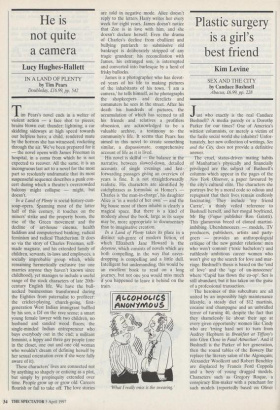He is not quite a camera
Lucy Hughes-Hallett
IN A LAND OF PLENTY by Tim Pears Doubleday, £16.99, pp. 542 Tim Pears's novel ends in a welter of violent action — a face shot to pieces; brains blown out; thunder; lightning; a car skidding sideways at high speed towards our helpless hero; a child, rendered mute by the horrors she has witnessed, rocketing through the air. We've been prepared for it — the novel opens with James Freeman in hospital, in a coma from which he is not expected to recover. All the same, it is an incongruous last act to a novel for the most part so resolutely undramatic that its most suspenseful sequence describes a punk con- cert during which a theatre's overcrowded balcony might collapse — might, but doesn't.
In a Land of Plenty is social-history-cum- soap-opera. Spanning most of the latter half of this century, it touches on the miners' strike and the property boom, the rise of the Green movement and the decline of art-house cinema, health faddism and computerised banking, radical feminism and radical Thatcherism. It does so via the story of Charles Freeman, self- made magnate, and his extended family of children, servants, in-laws and employees, a socially improbable group which, while remaining hermetically exclusive (no one marries anyone they haven't known since childhood), yet manages to include a useful range of the stock characters of late 20th- century English life. We have the bull- necked businessman transformed during the Eighties from paternalist to profiteer: the cricket-playing, church-going, first- generation West Indian immigrant baffled by his son, a DJ on the rave scene; a smart young female lawyer with two children, no husband and sanded wood floors; the single-minded Indian entrepreneur who buys everybody out in the end; a militant feminist, a hippy and three gay people (one in the closet, one out and one old woman who wouldn't dream of defining herself by her sexual orientation even if she were fully aware of it).
These characters' lives are connected not by anything so shapely or enticing as a plot, but simply by propinquity extended over time. People grow up or grow old. Careers flourish or fail to take off. The love stories are told in negative mode. Alice doesn't reply to the letters Harry writes her every week for eight years. James doesn't notice that Zoe is in love with him, and she doesn't declare herself. Even the drama of Charles's decline from ebullient and bullying patriarch to submissive old bankrupt is deliberately stripped of any tragic grandeur: his reconciliation with James, his estranged son, is interrupted and converted into burlesque by a herd of frisky bullocks.
James is a photographer who has devot- ed years of his life to making pictures of the inhabitants of his town. 'I am a camera,' he tells himself, as he photographs the shopkeepers and derelicts and commuters he sees in the street. After his death his hundreds of pictures, the accumulation of which has seemed to all his friends and relatives a profitless obsession, are acknowledged to be a valuable archive, a testimony to the community's life. It seems that Pears has aimed in this novel to create something similar, a dispassionate, comprehensive account of life as it is lived.
His novel is skilful — the balance in the narrative between slowed-down, detailed accounts of single evenings and fast- forwarding passages giving an overview of years is fine. It is not straightforwardly realistic. His characters are identified by catchphrases as formulaic as Homer's Charles is 'the man-in-charge', his daughter Alice is 'in a world of her own' — and the big house most of them inhabit is clearly a magical space. But there is a kind of modesty about the book, large as its scope may be, more appropriate to documentary than to imaginative creation.
In a Land of Plenty takes its place in a distinct sub-genre of modern fiction, of which Elizabeth Jane Howard is the doyenne, which consists of novels which are both compelling, in the way that eaves- dropping is compelling and a little dull. Intelligent but undemanding, this would be an excellent book to read on a long journey, but not one you would miss much if you happened to leave it behind on the train `What I really miss is the swearing.'


























































 Previous page
Previous page